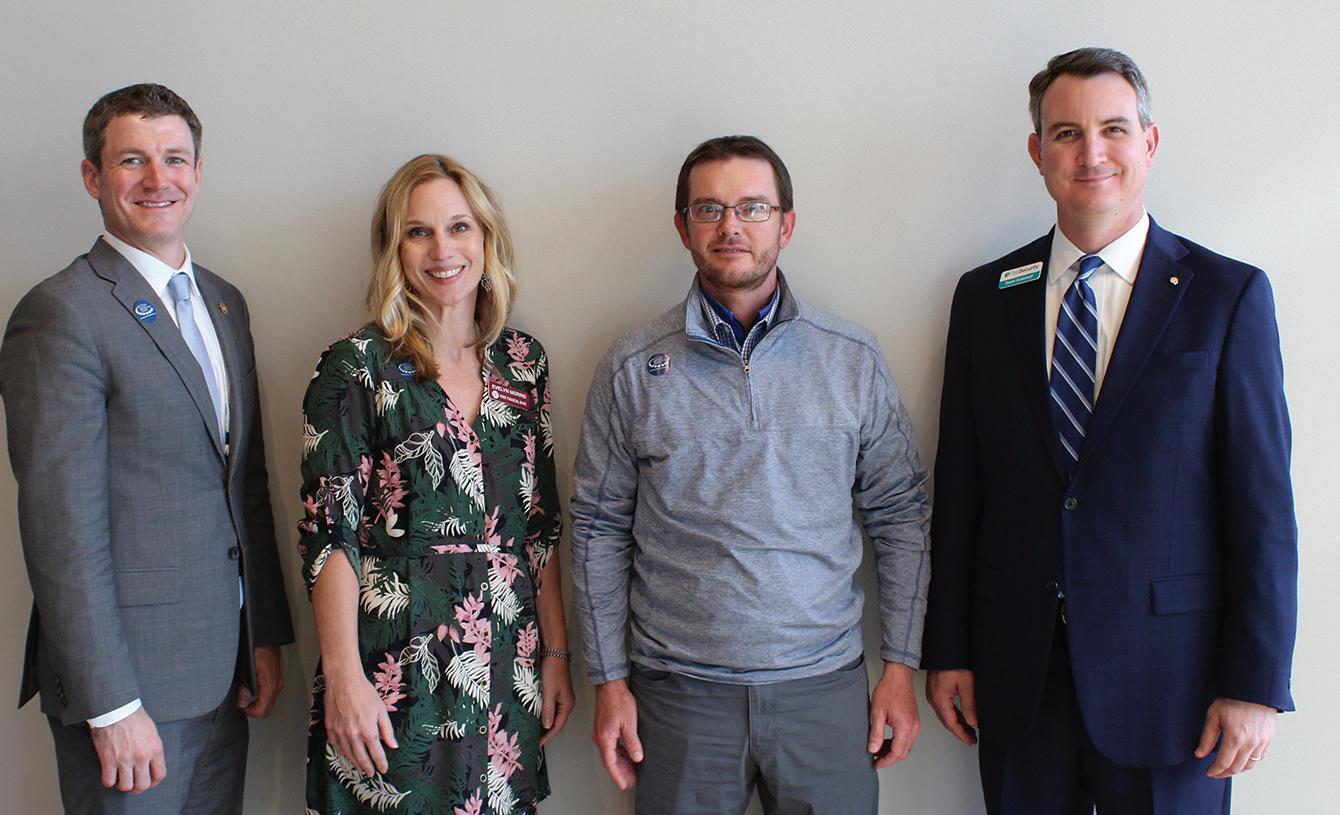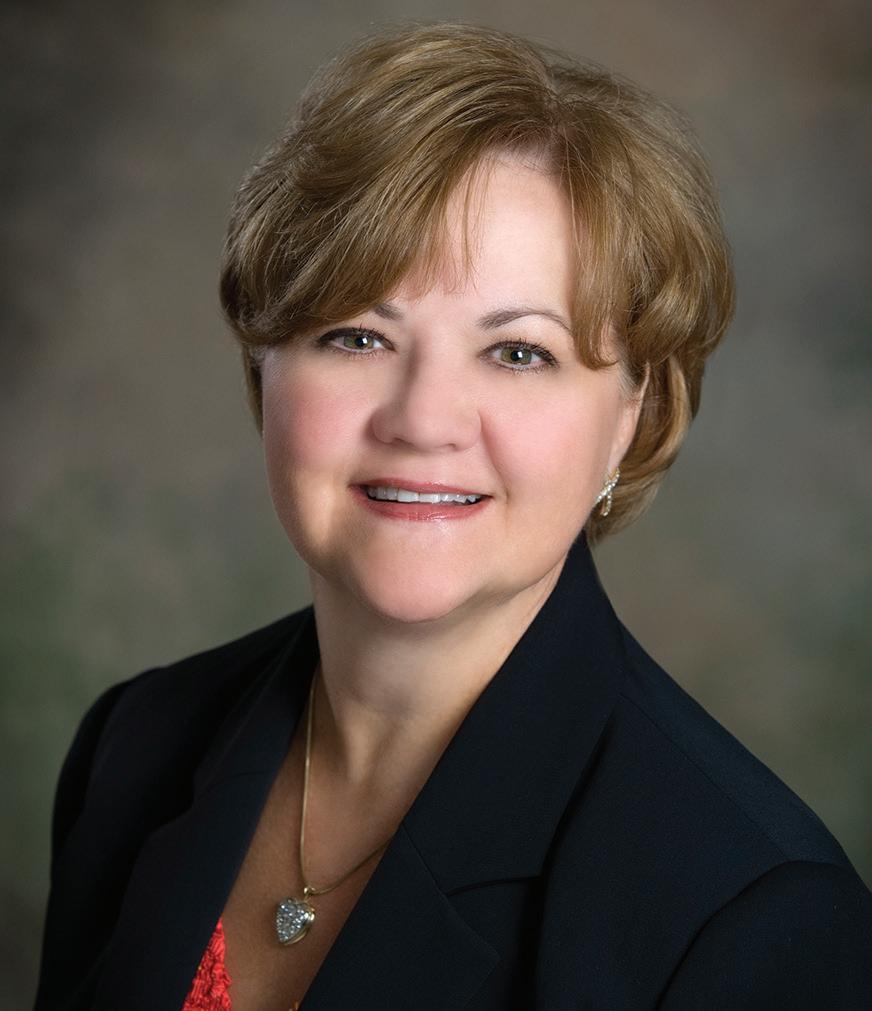
20 minute read
Repealing the Federal Tax Exemption for Credit Unions
By Erica York
Under current law, the federal tax code exempts credit unions from corporate income taxes. Credit unions were granted their tax exemption with the understanding they would provide financial services that were unavailable or difficult to obtain elsewhere to lower-income, unbanked individuals with a strong common bond.
However, evidence indicates that credit unions have evolved since their exemption was granted and now closely resemble other financial institutions that are subject to the corporate income tax. The exemption for credit unions is not justifiable on the grounds of sound tax policy. Credit unions face restrictions on the types and sizes of loans they can offer. For example, until 1977, most federal credit unions could not offer real estate loans. In the past, credit unions primarily provided small-value, nonmortgage loans to individuals and households; credit union assets were chiefly loans to individuals. These services were largely unavailable from traditional banks, especially for individuals of modest means during the Great Depression era.
Ultimately, credit unions have been expected to avoid high-risk, high-return investments in favor of safe, lower-interest investments, such as small personal loans.
Overview of the Exemption Credit unions are nonprofit financial cooperatives that accept deposits, make loans, and offer other types of financial services to their members. Federal chartering of credit unions began in the midst of the Great Depression with the Federal Credit Union Act of 1934. Prior to this, many states had passed laws allowing for state-chartered credit unions.
Evolution of the Industry Since the inception of the credit union tax exemption, the financial sector has undergone significant changes. Likewise, research has determined that “the credit union industry has evolved over time such that many of the financial services that credit unions now provide are similar to those offered by banks and savings associations.”
The original purpose of credit unions shows that they generally have three distinguishing characteristics to justify their exemption from federal income taxes: a restricted customer base, lowand middle-income members, and types of services offered.
Services Offered According to the Internal Revenue Service, a “major reason for the establishment of credit unions in this country was to provide their members with a source of personal loans, in small amounts and for a short term, which generally were difficult to obtain from other financial institutions, absent the payment of usurious interest rates.”
While the total number of credit unions has been in steady decline for decades, the industry is growing both in terms of members and assets. In 2008, the industry reported total assets of $885 billion and 88.6 million members. By the end of mid2019, the industry’s assets surpassed $1.5 trillion while membership increased to more than 118 million.
Data shows that credit unions are growing rapidly, which means that the revenue lost from the tax exemption is likewise growing. Given the changes in the financial sector, it is useful to examine the extent to which credit unions fulfill their original purpose — serving low- to middle-income customers with a common bond and avoiding risky investments in favor of smaller, safer investments — to see whether continued tax exemption is warranted.
While the total number of credit unions has been in steady decline for decades, the industry is growing both in terms of members and assets. ...Data shows that credit unions are growing rapidly, which means that the revenue lost from the tax exemption is likewise growing.
Expansion of Services Offered by Credit Unions The credit union industry has repeatedly tried to lift limits on what activities it can undertake, such as the caps on its business lending. Currently, lending to member businesses in excess of $50,000 is limited and business loans may not exceed 1.75 percent of a credit union’s net worth or 12.25 percent of a credit union’s total assets (whichever is lesser). But, credit unions sought and won approval to do business lending through the Small Business Administration; these loans, along with loans that are under $50,000, are not subject to the caps. Credit unions have also pushed to increase the limitations on loans and to exclude certain other business loans from the cap.
While these changes in services may align with broader changes in the financial sector, they do not align with the original, tax-exempt status of credit unions.
Reasons to Repeal the Credit Union Exemption As it stands today, the exemption for credit unions violates at least two principles of sound tax policy: neutrality and efficiency. The principle of neutrality requires taxing similar economic activities the same. Taxing some financial institutions that provide similar, or even the same, services while not taxing others violates this principle. Non-neutrality in the tax code leads to a misallocation of resources: the tax-exempt industry can grow at the expense of the taxed industry, leading the tax-exempt industry to become larger and less productive than the taxed industry. In the absence of preferential treatment, this inefficient diversion of resources would not occur.
Repealing the credit union tax exemption would make the tax code more equitable by treating similar economic activity the same. Additionally, it would provide lawmakers with revenue that could be used to make improvements to other areas of the tax code.
Conclusion Credit unions were granted tax-exempt status with the understanding that they would use their tax savings to serve tight-knit groups of customers of moderate means who could not access financial services at banks. However, in the decades since, credit unions have grown to resemble banks. The common bond of their members has been watered down to the point that there are credit unions anyone can join. Credit unions are not more likely than banks to serve lower-income households, and evidence indicates that credit union members may be more well off than bank customers. Finally, credit unions have begun offering services and engaging in activities that have traditionally been offered by taxable financial institutions.
The tax exemption for credit unions is not justifiable under principles of sound tax policy, nor under the rubric that lawmakers have used in the past to evaluate the tax-exempt status of financial institutions. Credit unions compete with banks for similar customers and offer similar financial services but do so with the benefit of not paying the taxes that their competition must pay. Ending this disparate treatment would improve the neutrality of the tax code and provide revenue that could be used to make pro-growth changes.
About the Author Erica York is an Economist with the Center for Federal Tax Policy at Tax Foundation.
For the complete article go to https://taxfoundation.org/repealing-credit-union-exemption/

By Bruce Johanson
The Arkansas Bankers Association (ABA) was established in 1891. Over the past 128 years, there have been a total of nine Association leaders. Another Arkansas organization was formed in 1973, Johanson & Associates, Inc. (J&A) and has had three leaders over the past 46 years. Even though J&A is only a third of the ABA’s age, the two organizations have had an ongoing relationship since the mid-80s. J&A has worked with five of the nine ABA leaders and staff and many of its member banks throughout Arkansas.
Bruce Johanson’s dad Dr. Richard (Dick) C. Johanson was a twenty-year career HR executive with Ford Motor Company and Continental-Emsco (parts supplier and services company to the oil industry) in Dallas, Texas before moving his family to Fayetteville, Arkansas the summer of 1969. From 1969 to 1989, Dick was a management professor for the Walton College of Business at the University of Arkansas. Dick formed J&A in 1973 as a management consulting firm and considered it a side business to supplement his professor salary. Bruce’s mom, Shirley, was the company’s secretary and handled all the administrative and secretarial functions. From 1973 to 1986, J&A assisted a variety of organizations including Gott Manufacturing Company that made the polyurethane coolers that were first used on utility vehicles.
“Dad worked closely with President/Owner Mr. Dick Gentry in Winfield, Kansas to expand its product line and ultimately, the company sold to Rubbermaid. Another project involved dad leading a strategic planning and organizational structure retreat for Governor Dale Bumpers and his cabinet members held at Queen Wilhelmina State Lodge,” recalls Bruce Johanson. In 1986, Bruce joined the family business after completing five years of HR experience in the oil and gas industry and two years of college level teaching in the Management Department at Arkansas Tech University in Russellville. That same year, Bruce and his father traveled to Little Rock to start what is now a 33-year relationship.
At the time, the ABA was in a seven-story office building in downtown Little Rock. “We met with ABA Executive Director H.C. “Bo” Carvill (1966 – 1994) to discuss the need for an Association strategic plan and base salary pay ranges for the ABA staff. I remember Bo and his office manager both smoked. Back then it was acceptable to smoke in the office, and there was a cloud of smoke in Bo’s office during our first meeting.” Once the projects were completed, J&A continued to support the ABA from an HR standpoint until Bo retired in 1994.
During Dick’s time with the company, he consulted with the following banks: Commercial National Bank of Little Rock, National Bank of Commerce in Pine Bluff, City National Bank of Fort Smith, First Western Bank of Booneville, First National Bank of Phillips County and Bank of Fayetteville. “Dad consulted to CEOs Bill Bowen, Sonny Henson, Jeral Hampton, Bill Brandon and John Lewis, plus up-and-coming bank executives including Jack Fleischauer, Jim Harwood and Bart Lindsey. Dad assisted John Lewis by completing the bank charter package that established Bank of Fayetteville in 1987,” says Bruce.
In 1989, Dick retired, and Bruce managed the company for the next eleven years. Bruce expanded the product offerings including leadership training, employee handbooks, salary and benefits surveys and HR outsourced services. Bruce supported ABA Executive Director Dan Bailey (1994 – 2000) and we com-

pleted a strategic plan, handled HR issues as needed, and kept the Association’s compensation structure updated. In addition, Bruce handled the HR function for Bank of Fayetteville until the bank grew to a size to hire a full-time internal HR professional. Some of the other banks that Bruce provided HR services to included First National Bank of Phillips County, Elk Horn Bank, Citizens Bank & Trust of Van Buren, Twin City Bank, and First Federal Bank.
In the 90s, J&A teamed up with banking ESOP expert Dr. Bob Sellers company Banking Consultants of America (BCA). Bruce implemented their copyrighted Job Evaluation and Salary Administration Program (JESAP 1985-2019) and performance-based incentive compensation plans as BCA was installing ESOP and other deferred compensation plans. Bruce assisted several bank clients in 15 different states and coast to coast.
In 1999, Bruce’s twin brother, Blair joined the firm and they changed the company name to Johanson Consulting, Inc. (JCI). Blair started in HR after obtaining his MBA from the University of Arkansas and then became a hospital administrator for a national drug and psychological hospital for seven years and a practice management operations professional for four years.
In 2000, John Lewis offered Bruce a position as the EVP of Retail Banking for Bank of Fayetteville. “I had been elected to the Board of Directors in 1997, and with Blair at the firm, I decided it made sense to change careers.”

While Bruce was at the Bank of Fayetteville, Blair was able to work with newly promoted ABA President/CEO Ken Hammonds (2000 – 2011) and provided HR support and strategic planning sessions with the ABA Board during Ken’s tenure at the ABA. When Bruce returned, Blair passed on the HR consulting support for the ABA until Ken’s retirement and ABA President/CEO William R. (Bill) Holmes (2012 – 2018) promotion.
“During Bill’s time, we developed a strategic plan, worked through HR issues, completed annual staff compensation plan updates, and started administering the annual Association’s Salary and Benefits Survey,” recalls Bruce.
It was this same time that Blair and Bruce decided to modernize the company name to Johanson Group (JG).
With Bill retiring from the Association in 2018 for health reasons, the fifth and current leader that the Johanson Group has had the opportunity to support was hired, President/CEO Lorrie Trogden. Lorrie just completed her first year last month and the Board of Directors did a great job selecting Lorrie. The Association is in good hands under her and her staff’s direction.
Artful expertise.
You’ve put in the time and effort to build a successful financial institution, and we’re dedicated to understanding your industry. Our banking buffs can help guide you through regulatory changes and perfect the masterpiece that is your business.
Everyone needs a trusted advisor. Who’s yours?
Graduate School of Banking at LSU Scholarship TWO Scholarships available* School: Graduate School of Banking at LSU Session Dates: May 25 - June 5, 2020 Deadline: March 29, 2020 Amount: $4,145 for first year only
Details: Over 15,000 executives have successfully completed the GSB program, held each spring on the LSU campus in Baton Rouge. The School’s purpose is to fill the need for graduate level study by bank officers and others meeting admission requirements leading toward a broader knowledge and understanding of major banking functions. Completion of the program has become a requisite to professional advancement in many banks. Executives at multi-billion dollar financial institutions as well as community banks find that the School’s curriculum addresses their educational needs. *one scholarship available exclusively to women and minorities
Jeffrey and Diana Owen Scholarship for Emerging Community Bank Leaders School: AmBA Stonier Graduate School of Banking Session Dates: June 4 -11, 2020 Deadline: March 1, 2020 Amount: $4,245 (AmBA member) or $5,245 (non-member) for first year only
Details: Stonier has provided executive education to more than 20,000 senior-level bankers and regulators, including some of the most respected banking executives in the U.S. The purpose of Stonier is to prepare today’s banking leaders for tomorrow’s opportunities by providing the nation’s premier executive education program. This develops the skills for effectively recognizing and handling high-level management issues, through the industry’s most thorough and rigorous curriculum, while preserving the integrity of how the business of banking is conducted.
Prochnow Educational Foundation & Arkansas Bankers Association Scholarship TWO Scholarships available School: Graduate School of Banking at Wisconsin Session Dates: August 2 - 14, 2020 Deadline: April 17, 2020 Amount: $4,500 ($1500 for three years)
Details: GSB’s Graduate School Program provides a comprehensive course of study of general banking and management subjects especially designed to meet the needs of bankers whose responsibilities and scope of activities are expanding. The school’s curriculum reflects the contemporary trends affecting the financial services industry. Core courses address broad areas of finance, marketing, management, and the environment in which banks operate.
GSBC/Arkansas Bankers Association Future Leaders Scholarship School: Graduate School of Banking at Colorado Session Dates: July 19 - 31, 2020 Deadline: March 1, 2020 Amount: $1,460 per year for up to three consecutive years
Details: The Graduate School of Banking at Colorado (GSBC) partners with the Arkansas Bankers Association each year to offer the GSBC Future Leaders Scholarship. Awarded to one banker per state, per year, recipients receive $1,360 per year for three years to attend GSBC’s Annual School Session, and must enter as a first-year student.
GSB Human Resource Management School Scholarship School: Graduate School of Banking at Wisconsin Session Dates: March 29 - April 3, 2020 Deadline: February 21, 2020 Amount: $1,050
Details: GSB’s Human Resource Management School provides the foundation for new or veteran human resource professionals to tie together important issues in human resource management with an understanding of the business of banking. This is your opportunity to learn from respected industry experts about today’s key issues in human resource management and how they relate to the bank’s bottom line profits.
SWGSB Millennium Scholarship School: SW Graduate School of Banking Session Dates: May 25 - June 4, 2020 Deadline: March 29, 2020 Amount: $1,500 per year for up to three consecutive years
Details: The SW Graduate School of Banking (SWGSB) is the financial services industry’s best source for education, training and information – designed specifically for bank officers. It is considered by many to be the nation’s top educational source for commercial and consumer lenders, loan and operations officers, bank regulators, as well as marketing and management professionals. Visit www.arkbankers.org or call Kami Coleman at 501.978.3614 for more information on how to apply.
Evelyn Morris | ELS President Arkansas Bankers Association

How long have you been in the banking industry, and with First Financial Bank?
For all practical purposes, I was born into banking. I am a 5th generation banker. My great-great grandfather played a pivotal role in the founding of the Arkansas Bankers Association and my great-grandfather, grandfather, and father all served as charimen of the ABA. I started my banking career nearly 16 years ago as a Bank Examiner with the Arkansas State Bank Department and I have been with First Financial Bank almost six years.
How long have you been involved with the Emerging Leaders Section of the Arkansas Bankers Association?
I attended my first Emerging Leaders Conference early in my career. Then I served on the Emerging Leaders Council from 2009-2013.

What are some of your favorite experiences from being involved in the Emerging Leaders Section?
Every banker has a story. And those stories are shared at the Emerging Leaders Leadership Conference.
Through my involvement with Emerging Leaders listening to stories of leading bankers and developing friendships with my peers from across the state have been my favorite experiences. Several examples include how another banker helped them achieve success by taking a risk on them or opened doors of opportunity. Other stories offer the lessons of “do’s and don’ts”, or the importance of staying connected with your peers because there will come a time when you need each other. Not ‘if’ you will need each other, but ‘when’ you will need each other. Listening to the stories of bank leaders has provided valuable insight that I have carried with me long after the conference is over.
What advice do you have for anyone just getting started in the banking industry, or someone who has worked in the industry only for a short time?
Make the effort to grow your perspective.
If given the opportunity, go to work for the Arkansas State Bank Department. This experience will give you a global perspective by exposing you to multiple areas of a bank. It can give you the opportunity to see how a different banks operate, allow you to see management practices that lead to success, and creates opportunities to develop peer relationships.
Don’t turn down the opportunity to learn a new area of the bank. Apply for positions that will grow you. It will only broaden your knowledge and experience, and give you a better perspective.
The most enjoyable aspect of being a banker is knowing what we do changes lives for the better.
Not only do we have an impact on our customers, but bankers have a meaningful and positive impact on the communities we serve. While banks are the backbone of our communities, bankers are the boots on the ground, serving on non-profit boards and other organizations that help people, grow our local economies, and bear much good fruit. I love sitting back and observing something great in our community knowing we played a part.
As the 2019-2020 Emerging Leaders Section president, are there any specific goals you would like to achieve?
I hope to work with the ABA staff, Brandon, and Derek to spark involvement among Emerging Leaders in the association, to ensure every banker in the state knows about the Emerging Leaders Section, and to explore new avenues to improve the gap between Emerging Leaders and Executive Leaders.
Are you involved in any other organizations or extracurricular activities?
I am a mom; therefore, my most important extracurricular activities include standing on the side lines watching our girls enjoy soccer, dance, and softball, and Campfire girls.
I also enjoy serving on the United Way Board of Union County and leading a Bible Study.
Tell us something that your fellow bankers might be surprised to know about you!
I enjoy painting abstract art. I like using the “right side” of my brain as much as the “left side”.
Is there anything else you would like to share with our Arkansas bankers?

I am thankful for the opportunity to serve as the ELS President and look forward to a great year!


Photos: (Opposite page, bottom) Evelyn and her father, Joe Miles, retired banker and former ABA chairmen.
Top photo: Evelyn and her husband David, and daughters Claire and Cameron.
Above photo: Evelyn serving alongside other United Way board members at the Salvation Army.
ELS Council Members 2019-2020 Brent Atkins Simmons Bank Hot Springs Shawn Dunham United Bank Rogers Brock Ferguson Centennial Bank Jonesboro Whit Penick First Security Bank Little Rock Ralph Bradbury First National Bank Little Rock
Carrie Price Southern Bancorp Arkadelphia Christie Turner First State Bank Fayetteville Reggie English MNB Bank Malvern Lance Nutt FBT Bank & Mortgage Fordyce Chris Pledger First Service Bank Little Rock Kyle Schlenker First Financial Bank Cherry Valley Evelyn Morris President First Financial Bank El Dorado Brandon Gentry Vice President Cross County Bank Wynne Derek Eckelhoff Secretary/Treasurer First Security Bank Rogers ELS Executive Members The Emerging Leaders Section (ELS) was organized by, and is under the direction of, the Arkansas Bankers Association (ABA) Board of Directors. The ELS was established to provide leadership and professional development training ground for the state’s young bankers, and to prepare them to become the industy’s next generation of leaders. These are the 2019-2020 council leaders. 32 The Arkansas Banker n Winter 2019
Emerging Leaders LEADERSHIP CONFERENCE
Develop. Connect. Engage.
The 2019 Emerging Leaders Leadership Conference offered networking opportunities and the chance for young bankers to meet with peers last October in downtown Little Rock at the Clinton Presidential Center.
The slate of speakers at the conference included Joe Micallef, Donna Flynn, and Dave DeFazio. Micallef’s “Create a Culture of Success” provided tips for developing training programs for businesses. A native of Australia, Micallef also showed effective ice-breaking techniques which made for a fun session.
Donna Flynn demonstrated that managing people and leading people is both an art and a science. She showed how to recognize defensiveness and how to deal with it and focus on the “real” issues at hand, rather than the distractions.
Dave DeFazio hit the ground running with a list of apps to help the business person in the 21st century capitalize on how to manage money and help their finances work better and smarter. He showed how consumer purchase behaviors and changing attitudes about traditional banking have created an opening for digital trendsetters to reimagine how financial services can work in a modern world.
The conference was also the setting for the announcement of the winner of the Bill Holmes Leadership Award. The inaugural recipient was Beth Presley of Arvest Bank of Fort Smith. The award is named in honor and memory of the late Bill Holmes, who served as president & CEO of the Arkansas Bankers Association from 2012 – 2018. The award is in recognition of outstanding leadership and community commitment among emerging leaders in Arkansas banking. Nominees are considered for this award based on their contributions to team success, industry success, and making an impact on their community.


(Above photo) 2018-2019 ELS President, George Purvis, 2019-2020 ELS officers: President Evelyn Morris, Vice President Brandon Gentry, and Secretary/Treasurer Derek Eckelhoff.
(Below photo) Bill Holmes Leadership Award winner, Beth Presley (holding award) with some of her Arvest co-workers.











